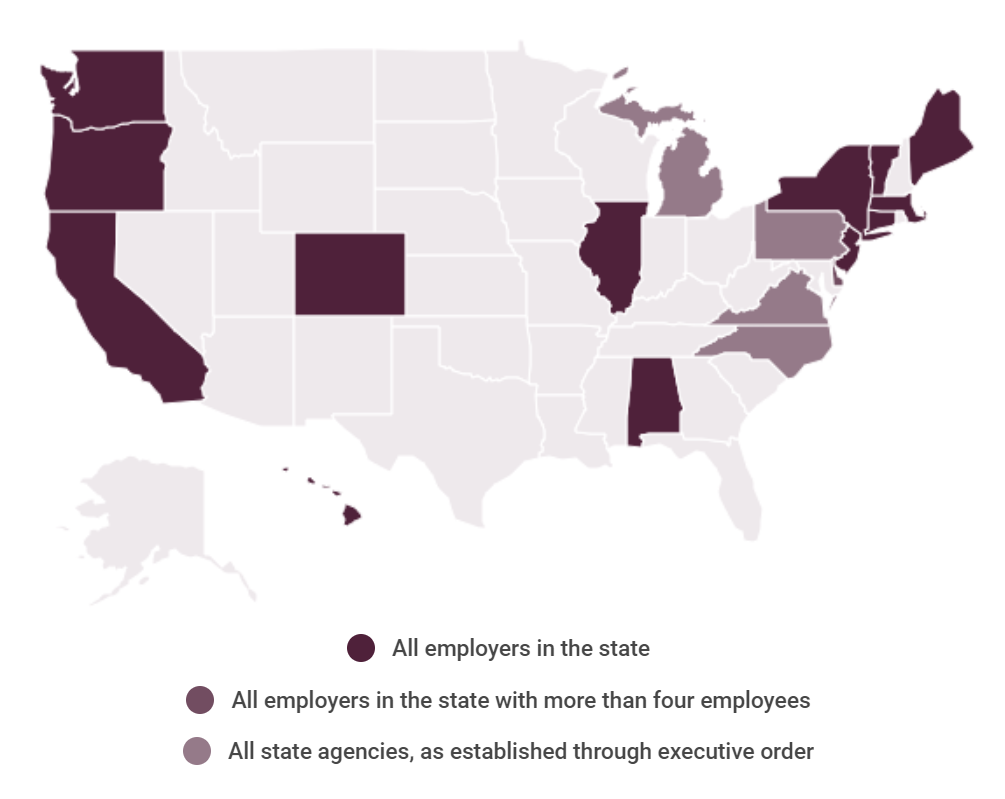
Share On Social!
Inequities in pay follow women from job to job.
Employers that request an applicant’s salary history─a long-time standard practice to set compensation for new-hires─perpetuate these gender pay inequities.
“Relying on salary history allows a new employer to continue underpaying a woman who faced a pay gap and lost wages due to bias or discrimination at a previous job,” according to a 2018 report from the American Association of University Women (AAUW).
One method to close the gender pay gap is to ban employers from relying on previous or current salary information when setting pay for new employees.
Closing the gender pay gap is good for physical, mental and social health.
However, less than half of states have such bans.
Find out which places have banned salary history inquiries. Then use the AAUW’s advocacy tools to urge your elected officials to create a ban.
States Working to Close the Pay Gap
Nationwide, 18 states have passed legislation banning employers from relying on salary history to set wages, as of July 2019.
- All employers (with some limitation depending on number of employees) are banned from using salary history in Alabama (4.4% Latino), California (39.3% Latino), Colorado (21.7% Latino), Connecticut (16.5% Latino), Delaware (9.5% Latino), Hawaii (10.7% Latino), Illinois (17.4% Latino), Maine (1.7% Latino), Massachusetts (12.3% Latino), New Jersey (20.6% Latino), New York (19.2% Latino), Oregon (13.3% Latino), Vermont (2.0% Latino), and Washington (12.9% Latino).
- In Michigan (5.2% Latino), North Carolina (9.6% Latino), Pennsylvania (7.6% Latino), and Virginia (9.6% Latino), only state agencies and departments are banned from inquiring about an applicant’s salary history.
Some state laws go further to also ban employers from relying on an applicant’s pay history to set compensation if discovered or volunteered.
Some laws are more conservative. In Alabama, for example, employers may inquire about an applicant’s salary history, but they can’t discriminate based on an applicant’s refusal to answer.

Oregon’s Equal Pay Act of 2017 bans salary inquiries.
Michelle Valentis, director of recruiting and human resources at Reed College in Portland, appreciates Oregon’s law, according to SHRM.org.
She also encourages employers to also list starting pay in job descriptions. But she expects some employers to argue they cannot post the pay for a job because they may pay more or less, depending on the applicant’s experience and qualifications.
“I’d counter this argument by saying that we should pay people for the job they’re doing today, rather than the jobs they did on their resumes,” Valentis said, according to SHRM.org.
Localities Working to Close the Pay Gap
Nationwide, 19 localities have passed ordinances banning employers from relying on salary history to set wages, as of July 2019:
- All employers (with some limitation depending on number of employees) are banned from using salary history in Albany County, New York (6.1% Latino); Cincinnati, Ohio (3.6% Latino); Kansas City, Missouri (10.2% Latino); New Orleans, Louisiana (5.5% Latino); New York, New York (29.1% Latino); Philadelphia, Pennsylvania (14.4% Latino); San Francisco, California (15.4% Latino); St. Louis County, Missouri (3.0% Latino); Toledo, Ohio (8.3% Latino); and Westchester County, New York (25.1% Latino).
- In Atlanta, Georgia (4.6% Latino); Chicago, Illinois (29.0% Latino); Columbia, South Carolina (5.8% Latino); Jackson, Mississippi (1.1% Latino); Louisville, Kentucky (5.2% Latino); Montgomery County, Maryland (19.9% Latino); Pittsburgh, Pennsylvania (2.9% Latino); Richland County, South Carolina (5.2% Latino); and Salt Lake City, Utah (21.3% Latino), only local agencies and departments are banned from inquiring about an applicant’s salary history.
For example, prior to the ban, the public transit system serving the Pittsburgh region, the Port Authority of Allegheny County, offered a candidate 5% more than the previous salary listed.
Now, the transit agency establishes a salary for the job regardless of a candidate’s salary history.
Unfortunately, Michigan and Wisconsin prohibit localities from establishing salary history bans, known as preemption.
You can urge your local and state officials to ban salary history inquiries.
AAUW developed a Policy Guide to Equal Pay in the States and multiple guides to help you advocate for equal pay.
Explore More:
Understanding & Reducing PovertyBy The Numbers
23.7
percent
of Latino children are living in poverty



